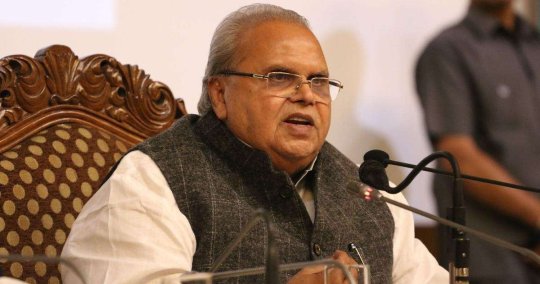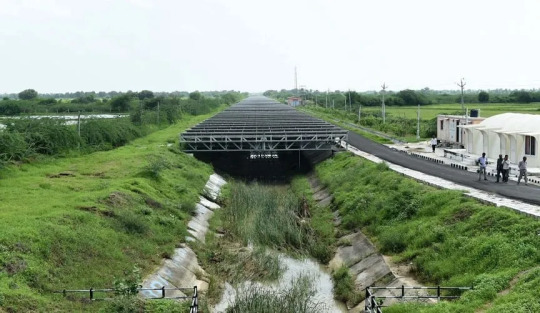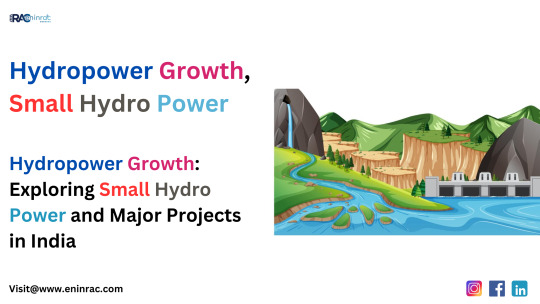#Hydropower Project
Explore tagged Tumblr posts
Text
IREDA Finalizes Joint Venture for Hydropower Expansion in Nepal
State-owned Ireda has finalised a joint venture agreement with SJVN, GMR Energy and the Nepal Electricity Authority to set up a 900 megawatt hydropower project in Nepal. The agreement for the 900 MW Upper Karnali hydro-electric project was formalised in New Delhi on Thursday, in the presence of senior officials from Ireda, SJVN, and GMR Energy. In a statement on Thursday, Ireda said, “It has…
#(IREDA)#GMR Energy#Hydropower Project#Nepal Electricity Authority#Upper Karnali Hydro Electric Project
0 notes
Text
Turbulent Waters: Unraveling the India-China Struggle Over the Brahmaputra
The waters of the Brahmaputra, or Yarlung Tsangpo as it is known in Tibet, have always been a lifeline for millions. Yet, they are now becoming a flashpoint in the geopolitical tensions between India and China. With Beijing’s ambitious plans to construct a colossal $137 billion hydropower project in Medog County, the stakes for South Asia’s environmental and water security have reached unprecedented heights.
China’s proposed dam, designed to harness the staggering 2,000-meter drop of the Brahmaputra’s flow, promises to generate 60,000 MW of power—enough to light up entire nations. However, for India and Bangladesh, this “green project” risks becoming a poisoned chalice. The environmental consequences and geopolitical implications could ripple far downstream, impacting millions who depend on the river for their livelihoods...Read more
#India-China relations#Brahmaputra River#Yarlung Tsangpo#hydropower project#South Asia water security#Tibet ecosystem#environmental risks#Himalayan dams#transboundary river cooperation#India-China geopolitics
0 notes
Text
400 Families to Receive Compensation from Arun III Hydropower Project
Around 400 families are set to receive compensation for land acquired for the construction of the 900 MW Arun III Hydropower Project in Makalu Rural Municipality, Sankhuwasabha, as nearly 80% of the project’s work has been completed. The Supreme Court issued a directive on December 26, 2024, instructing authorities to provide compensation within a month, based on a notice published by the…
0 notes
Text
रॉयल्टी के आधार पर बात नहीं बनी तो सरकार करेगी जल विद्युत परियोजनाओं का अधिग्रहण; सीएम सुक्खू
Himachal News: मुख्यमंत्री सुखविंदर सिंह सुक्खू ने कहा है कि अगर तय रॉयल्टी के आधार पर प्रदेश सरकार और सतलुज जल विद्युत निगम के बीच सहमति नहीं बनी तो प्रदेश सरकार जनहित में एसजेवीएन से सुन्नी, लुहरी और धौलासिद्ध परियोजनाएं अपने अधिग्रह��� में ले लेगी। मुख्यमंत्री आज शिमला में उनसे मिलने आए सुन्नी, लुहरी पनविद्युत परियोजना के प्रभावितों के एक प्रतिनिधिमंडल को संबोधित कर रहे थे। उन्होंने प्रभावित…
0 notes
Text
What are the challenges of implementing hydro power projects in India?
The National Electricity Policy of 2005, the National Tariff Policy of 2016, the National Rehabilitation & Resettlement Policy of 2007, and the Right to Fair Compensation & Transparency in Land Acquisition, Rehabilitation, and Resettlement Act of 2013 are just a few of the policy initiatives that the Indian government has put into place over the years to promote the development of the hydropower sector in the nation. The government also unveiled additional initiatives to support the hydropower industry on March 8, 2019, which include the following clauses:
Identifying large hydro projects (more than 25 MW) as a source of renewable energy
Strategies for rationalizing tariffs to lower the hydropower tariff
Financial Assistance for Hydroelectric Storage and Flood Moderation Projects (HEPs)
Financial Assistance for the Cost of Infrastructure Enablement, such as Roads and Bridges

0 notes
Text
EFCC declares company promoter wanted over failed $6bn Mambilla Hydropower Project

The EFCC posted the notice declaring Mr Adesanya, a promoter of Sunrise Power and Transmission Ltd, wanted on its verified Facebook page on Wednesday.
Nigeria’s anti-corruption agency, EFCC, has declared Leno Laitan Adesanya, a promoter of Sunrise Power and Transmission Ltd, wanted over his alleged role in the $6 billion Mambilla hydropower contract.
The EFCC posted the notice declaring Mr Adesanya wanted on its verified Facebook page on Wednesday.
In the publication signed by EFCC spokesperson Dele Oyewale, the commission urged members of the public to volunteer useful information about Mr Adesanya’s whereabouts.
Mr Adesanya, 66, hails from Eti-Osa Local Government Area of Lagos State.
Background
In January, the EFCC arraigned a former Minister of Power and Steel, Olu Agunloye, on corruption charges concerning the failed multi-billion-dollar Mambilla Hydropower project.
In one of the seven counts filed by the anti-graft agency, it accused Mr Agunloye of awarding a contract in May 2003 for the construction of 3,960 megawatts (mw) Mambilla Hydroelectric Power Station on a ‘Build, Operate and Transfer basis’ “without any budgetary provision, approval and cash backing”.
The commission said the award of the contract to Sunrise Power and Transmission Company Limited (SPTCL) constituted an offence contrary to and punishable under Section 22(4) of the Corrupt Practices and Other Related Offences Act, 2000.
It also accused Mr Agunloye of corruptly receiving N3.6 million from Sunrise Power company in August 2019, years after leaving office, for the purported approval of the federal government for the award of the contract to the company.
EFCC said this act is also contrary to and punishable under Section 8(1)(a) and (b) of the Corrupt Practices and Other Related Offences Act, 2000.
But Mr Agunloye denied all the charges, insisting that he is being picked on as the fall guy for the government’s mishandling of the project, while those who were responsible for it were left off the hook.
The project, first awarded in 2003 to Sunrise Power and Transmission Limited by the Olusegun Obasanjo-led administration, is the subject of decades of a legal dispute that is now under international arbitration between the company and the Nigerian government.
Mr Obasanjo, in distancing himself from the botched contract, claimed that he was not aware that the contract was awarded by his then-minister, Mr Agunloye.
According to Mr Agunloye, the contract for the project was duly awarded in 2003 by the Obasanjo administration on a Build, Operate and Transfer basis to deliver Nigeria’s biggest power plant with over 3,000 megawatts capacity at no cost to the Nigerian government.
The project was expected to address Nigeria’s intractable energy crisis.
#efcc#Mambilla Hydropower Project#company promoter#failed $6bn#news#nigerianewstimes#Sunrise Power and Transmission Ltd
1 note
·
View note
Text
CBI raids ex-J&K Governor Satyapal Malik's premises in Kiru hydroelectric project case
NEW DELHI — The CBI on Thursday searches the premises of former Jammu and Kashmir governor Satya Pal Malik and 29 other locations in connection with alleged corruption in the Kiru Hydropower project, officials said. The agency started its operation in the morning with around 100 officers mobilised to swoop down at 30 locations in multiple cities, they said. The case relates to alleged corruption…

View On WordPress
#Central Bureau of Investigation (CBI)#Corruption Case#J&K Governor#Jammu and Kashmir (J&K)#Kiru Hydro Electric Power Project#Kiru Hydropower Project#Satyapal Malik
0 notes
Text
Things the Biden-Harris Administration Did This Week #32
August 30-September 6 2024.
President Biden announced $7.3 billion in clean energy investment for rural communities. This marks the largest investment in rural electrification since the New Deal. The money will go to 16 rural electric cooperatives across 23 states Alaska, Arizona, California, Colorado, Florida, Illinois, Indiana, Iowa, Kentucky, Michigan, Minnesota, Montana, Nebraska, New Jersey, New Mexico, Nevada, North Dakota, Ohio, Pennsylvania, South Dakota, Texas, Wisconsin, and Wyoming. Together they will be able to generate 10 gigawatts of clean energy, enough to power 5 million households about 20% of America's rural population. This clean energy will reduce greenhouse emissions by 43.7 million tons a year, equivalent to removing more than 10 million cars off the road every year.
The Biden-Harris Administration announced a historic 10th offshore wind project. The latest project approved for the Atlantic coast of Maryland will generate 2,200 megawatts of clean, reliable renewable energy to power 770,000 homes. All together the 10 offshore wind projects approved by the Biden-Harris Administration will generation 15 gigawatts, enough to power 5.25 million homes. This is half way to the Administration's goal of 30 gigawatts of clean offshore wind power by 2030.
President Biden signed an Executive Order aimed at supporting and expanding unions. Called the "Good Jobs EO" the order will direct all federal agencies to take steps to recognize unions, to not interfere with the formation of unions and reach labor agreements on federally supported projects. It also directs agencies to prioritize equal pay and pay transparency, support projects that offer workers benefits like child care, health insurance, paid leave, and retirement benefits. It will also push workforce development and workplace safety.
The Department of Transportation announced $1 billion to make local roads safer. The money will go to 354 local communities across America to improve roadway safety and prevent deaths and serious injuries. This is part of the National Roadway Safety Strategy launched in 2022, since then traffic fatalities have decreased for 9 straight quarters. Since 2022 the program has supported projects in 1,400 communities effecting 75% of all Americans.
The Department of Energy announced $430 million to support America's aging hydropower. Hydropower currently accounts for nearly 27% of renewable electricity generation in the United States. However many of our dams were built during the New Deal for a national average of 79 years old. The money will go to 293 projects across 33 states. These updates will improve energy generation, workplace safety, and have a positive environmental impact on local fish and wildlife.
The EPA announced $300 million to help support tribal nations, and US territories cut climate pollution and boost green energy. The money will support projects by 33 tribes, and the Island of Saipan in the Northern Mariana Islands. EPA Administer Michael S. Regan announced the funds along side Secretary of the Interior Deb Haaland in Arizona to highlight one of the projects. A project that will bring electricity for the first time to 900 homes on the Hopi Reservation.
The Biden-Harris Administration is investing $179 million in literacy. This investment in the Comprehensive Literacy State Development Grant is the largest in history. Studies have shown that the 3rd grade is a key moment in a students literacy development, the CLSD is designed to help support states research, develop, and implement evidence-based literacy interventions to help students achieve key literacy milestones.
The US government secured the release of 135 political prisoners from Nicaragua. Nicaragua's dictator President Daniel Ortega has jailed large numbers of citizens since protests against his rule broke out in 2018. In February 2023 the US secured the release of over 200 political prisoners. Human rights orgs have documented torture and sexual abuse in Ortega's prisons.
The Justice Department announced the disruption of a major effort by Russia to interfere with the 2024 US Elections. Russian propaganda network, RT, deployed $10 million to Tenet Media to help spread Russian propaganda and help sway the election in favor of Trump and the Republicans as well as disrupting American society. Tenet Media employs many well known conservative on-line personalities such as Benny Johnson, Tim Pool, Lauren Southern, Dave Rubin, Tayler Hansen and Matt Christiansen.
Vice-President Harris outlined her plan for Small Businesses at a campaign stop in New Hampshire. Harris wants to expand from $5,000 to $50,000 tax incentives for startup expenses. This would help start 25 million new small business over four years.
#Thanks Biden#Joe Biden#kamala harris#climate change#climate action#wind power#Russia#human rights#politics#US politics#america politics#worker's rights#road safety
1K notes
·
View notes
Text
"India has reached a key milestone in renewable energy, with the country’s total renewable energy capacity exceeding 200 gigawatts as of Oct. 10, 2024, according to the Central Electricity Authority. The renewable energy-based electricity generation capacity now stands at 201.45 GW, accounting for 46.3% of the nation’s total installed capacity.
This milestone is the result of years of efforts to harness India’s natural resources. From solar parks to wind farms and hydroelectric projects, the country has built a diverse renewable energy base, reducing fossil fuel dependence and enhancing energy security.
India's total electricity generation capacity has reached 452.69 GW, with renewable energy contributing a significant portion of the overall power mix as the country continued to increase its dependence on cleaner, non-fossil fuel energy sources and push towards its sustainability goals.
When factoring in the 8,180 MW of nuclear capacity, the total non-fossil fuel-based power now accounts for almost half of the country's installed electricity generation capacity, signalling a strong move towards clean energy leadership on the global stage.
Renewable Energy
A variety of renewable energy resources contribute to this impressive figure. Solar power leads the way with 90.76 GW, playing a crucial role in India’s efforts to harness its abundant sunlight. Wind power follows closely with 47.36 GW, driven by the vast potential of the coastal and inland wind corridors across the country.
Hydroelectric power is another key contributor, with large hydro projects generating 46.92 GW and small hydropower adding 5.07 GW, offering a reliable and sustainable source of energy from India’s rivers and water systems.
Biopower, including biomass and biogas energy, adds another 11.32 GW to the renewable energy mix. These bioenergy projects are vital for utilising agricultural waste and other organic materials to generate power, further diversifying India’s clean energy sources. Together, these renewable resources are helping the country reduce its dependence on traditional fossil fuels while driving progress towards a more sustainable and resilient energy future.
Leading States In Renewable Energy Capacity
Several states in India have emerged as leaders in renewable energy capacity, making significant contributions to the nation's progress. These states are essential to advancing India’s renewable energy goals and fostering a sustainable energy future.
Rajasthan leads the pack with an impressive 29.98 GW of installed renewable energy capacity, capitalising on its extensive land and abundant sunlight.
Following closely is Gujarat, which boasts a capacity of 29.52 GW, driven by its strong focus on solar and wind energy projects. Tamil Nadu ranks third with 23.70 GW, leveraging its favourable wind patterns to generate substantial energy. While Karnataka rounds out the top four with a capacity of 22.37 GW, supported by a mix of solar and wind initiatives.
India's commitment to renewable energy is reflected in the annual electricity generation trends in recent years. The Government of India has introduced various measures and initiatives to promote and accelerate renewable energy capacity nationwide, aiming for an ambitious target of 500 GW of installed capacity from non-fossil sources by 2030."
-via NDTV, October 14, 2024
#india#renewables#renewable energy#wind power#green energy#clean energy#solar power#solar energy#climate action#climate hope#rajasthan#gujarat#tamil nadu#karnataka#south asia#asia#good news#hope
343 notes
·
View notes
Text

In the elevated Indus Valley of Pakistan, you'll find some of the world's most intricate and diverse petroglyphs. Specifically, the ancient Shatial glyphs along the Karakoram Highway in the Gilgit-Baltistan region stand out. Dating back to the Stone Age, these glyphs adorn rocks and boulders, extending for over 100 kilometers. Encompassing various languages, religions, and the symbolism of peoples spanning 10,000 years, these remarkable writings and designs face potential threats from modern hydropower projects planned in the Indus Valley.
505 notes
·
View notes
Text
The Best News of Last Week
🦾 - High-Five for Bionic Hand
1. Houston-area school district announces free breakfast and lunch for students

Pasadena ISD students will be getting free breakfast and lunch for the 2023-24 school year, per an announcement on the district's social media pages.
The 2023-24 free lunch program is thanks to a Community Eligibility Provision grant the district applied for last year. The CEP, which is distributed by the Department of Agriculture, is specially geared toward providing free meals for low-income students.
2. Dolphin and her baby rescued after being trapped in pond for 2 years
youtube
A pair of dolphins that spent nearly two years stuck in a Louisiana pond system are back at sea thanks to the help of several agencies and volunteers.
According to the Audubon Nature Institute, wildlife observers believe the mother dolphin and her baby were pushed into the pond system near Grand Isle, Louisiana, during Hurricane Ida in late August 2021.
3. Studies show that putting solar panels over waterways could boost clean energy and conserve water. The first U.S. pilot project is getting underway in California.

Some 8,000 miles of federally owned canals snake across the United States, channeling water to replenish crops, fuel hydropower plants and supply drinking water to rural communities. In the future, these narrow waterways could serve an additional role: as hubs of solar energy generation.
4. Gene therapy eyedrops restored a boy's sight. Similar treatments could help millions

Antonio was born with dystrophic epidermolysis bullosa, a rare genetic condition that causes blisters all over his body and in his eyes. But his skin improved when he joined a clinical trial to test the world’s first topical gene therapy.
The same therapy was applied to his eyes. Antonio, who’s been legally blind for much of his 14 years, can see again.
5. Scientists develop game-changing vaccine against Lyme disease ticks!

A major step in battling Lyme disease and other dangerous tick-borne viruses may have been taken as researchers announced they have developed a vaccine against the ticks themselves.
Rather than combatting the effects of the bacteria or microbe that causes Lyme disease, the vaccine targets the microbiota of the tick, according to a paper published in the journal Microbiota on Monday.
6. HIV Transmission Virtually Eliminated in Inner Sydney, Australia

Sydney may be the first city in the world to end AIDS as a public health threat by 2030. Inner Sydney has reduced new HIV acquisitions by 88%, meaning it may be the first locality in the world to reach the UN target to end AIDS as a public health threat by 2030
7. New bionic hand allows amputees to control each finger with unprecedented accuracy

In a world first, surgeons and engineers have developed a new bionic hand that allows users with arm amputations to effortlessly control each finger as though it was their own body.
Successful testing of the bionic hand has already been conducted on a patient who lost his arm above the elbow.
----
That's it for this week :)
This newsletter will always be free. If you liked this post you can support me with a small kofi donation:
Support this newsletter ❤️
Also don’t forget to reblog.
897 notes
·
View notes
Text
Upper Arun Hydropower Project's Environmental Impact Assessment Approved
Kathmandu — The Environmental Impact Assessment (EIA) of the Upper Arun Hydropower Project has been approved. The Ministry of Forests and Environment has prioritized the Upper Arun Project and announced that the EIA was approved on January 3. The hydropower project, located in Bhotekhola of Sankhuwasabha, has a total estimated cost of NPR 214 billion. The Upper Arun Hydropower Project has a total…
0 notes
Text
Early uses of electric trains (that may surprise you)
This doesn’t explicitly apply about any canon characters, though you could use it to expand on/reinterpret Electra, the Nationals, or make OCs. I’ve just noticed a lot of people in the Stex fandom, and even just general railfans, that don’t realize that electrification historically has had waaaay more uses than environment friendliness and high speeds. Here are some other things it was used for in the days before global warming was on anyone’s radar and smoke was considered a sign of prosperity (the early-mid 20th century)
TUNNELS- burning things in enclosed spaces is a pretty well known way to get carbon monoxide poisoning. Even open-ended but long, slow-speed tunnels had issues with smoke and exhaust from steam and even diesel engines lingering and blocking vision/suffocating people, leading to gas masks or cab forward engines being used. So these became some of the first places to require electrification. And it wasn’t just subways, you also had underground mines and long tunnels through the mountains like the Cascades Tunnel.
HILLS: Due to electric motors being strongest at low speeds (and steam engines being strongest at full speed) and much better power to weight ratio, electric trains are REALLY good on steep, long inclines, especially if there’s any stopping involved. The Milwaukee Road’s Pacific Extension, the Virginian Railway, and basically the entire country of Switzerland are fun examples of early electric lines on rugged mountainsides where even very large steam engines struggled. On top of that, running downhill with regenerative brakes dramatically axes the amount of total power used. And as an added weird bonus, extreme low temperatures and lower oxygen at high altitudes impaired the performance of combustion engines on parts of the Milwaukee Road but electric engines saw no losses or even outright benefits due to enhanced motor cooling (cooling traction motors is a big deal and why a lot of older electric engines have such loud fans)
ACCELERATION: Electric engines and EMUS especially are great at stopping/starting quickly, making them great for commuter trains with frequent stops. This allows greater train frequency without increasing tracks, and is a major benefit of electrification even today (see Caltrain’s electrification project). Also see the GER Class A55 for how extreme steam engineering had to get to compete at the turn of the century.
SHEER POWER: It’s hard to overstate just how much more powerful individual electric engines can be vs diesel or even steam, not having to carry their own power source allows them to access a lot more. Just take a look at the “most powerful locomotives” wikipedia list, and that one actually leaves off a LOT of mostly older electric engines that would outclass steam/diesel ones included. There are a surprising number of huge early electric engines like the PRR FF1 with a similar tractive effort to later large steam engines (albeit a lot of these were slooow due to the aforementioned trait of motors being strongest at lowest speeds). This is also why high speed trains are almost all electric, their monstrous HP numbers are more to pull moderate loads at 200+ mph.
HYDROELECTRICITY: Using hydroelectric power was a practical and not environmental choice in the early 20th century and where it was readily available (especially where fossil fuels weren’t), electrification became very lucrative. Switzerland is the most extreme example, without much of a domestic supply of coal but a lot of hydropower. The Milwaukee Road and Pennsylvania Railroad also used dams as a major power source
MAINTENANCE AND LABOR COSTS: This was a bigger advantage in the steam era because the gap between them and steam engines in terms of maintenance and availability was so wide, and you can run multiple electric engines with one crew but double/triple heading steam engines requires one for each engine. They’re still competitive if not cheaper than diesel power today, especially on high-frequency routes, and especially when the costs of pollution are included. Electric trains are generally the lowest maintenance and most reliable of all traction, and tend to last longer due to fewer moving parts (50+ year lifespans are not rare). Now it’s more a matter of paying more up front and less on maintenance vs less up front and more on maintenance. The actual wires and infrastructure are a BIG up front cost that’s very hard for private businesses to do alone without government help (just see how many lines got bankrupted by these projects in the US in the early 20th century)
BONUS: this is technically a promo by the company itself, but it’s relatively willing to admit their faults, The Milwaukee Electrification
Goes into a lot of the points made above in a pretty fun and concise package
#stex#starlight express#reference#the tl;dr is electric trains are genuinely OP except the massive nerf of infrastructure costs/maintenance#and that is a VERY big nerf depending on economics/politics#i also say “trains” as a general term because most of this stuff applies to both locos/power cars and EMUs
26 notes
·
View notes
Text
Yesterday felt like an earthquake shook the foundations of our climate and environmental laws, followed by a hurricane that scattered the bits all over the place and a wildfire that burned those bits that weren't scattered. I didn't watch any part of yesterday's debauchery, either on TV or streaming or the alerts that pop up on my iPhone or iPad, or read anything (neither national, local or environmental or climate specialized media). I figured most of the crap he did yesterday will be the subject of strategic lawsuits, and much will be tossed out as contrary to legislation or regulation or unconstitutional. In other words, I'll pay attention to the reconstruction, not the destruction. But.......it was still a horse shit day.
This compilation from the Sabin Center for Climate Change Law (of the Columbia Law School/Columbia Climate School) is outstanding. Click/tap on the caption of this post and you'll be able to figure out what happened and sort things out as you want. Just click/tap on the caption and go for it. But if you don't want to do that, here's the compilation, abbreviated. Italicized/red fonts are my addition, either explanatory or editorial.
PUTTING AMERICA FIRST IN INTERNATIONAL ENVIRONMENTAL AGREEMENTS
Withdraw from Paris Climate Agreement
Withdraw from any other agreements made under UN Framework Convention on Climate Change (UNFCCC)
Revoke any financial commitments under UNFCCC
Revoke U.S. International Climate Finance Plan
DECLARING A NATIONAL ENERGY EMERGENCY
Declares national energy emergency, primarily based on high energy prices
Use any lawful emergency authorities “to facilitate the identification, leasing, siting, production, transportation, refining, and generation of domestic energy resources.”
Use Defense Production Act and federal eminent domain authorities
Issue emergency fuel waivers to allow year-round sale of E15 gasoline (E15 is ethanol/gasoline mix)
“Expedite the completion of all authorized and appropriated infrastructure, energy, environmental and natural resources projects”
Use emergency authorities and nationwide permits to grant approvals under Clean Water Act Sec. 404, Rivers and Harbors Act Sec. 10, and Marine Protection Research and Sanctuaries Act Sec. 103 for energy projects
Use emergency consultation processes under Endangered Species Act, and frequent convening of Endangered Species Act Committee, for energy projects
Use construction authority of Army Corps of Engineers
The term “energy” is defined to mean “crude oil, natural gas, lease condensates, natural gas liquids, refined petroleum products, uranium, coal, biofuels, geothermal heat, the kinetic movement of flowing water, and critical minerals” [not wind or solar] (excluding wind and solar is childish and just plain stupid)
UNLEASHING AMERICAN ENERGY
“eliminate the ‘electric vehicle (EV) mandate’ and promote true consumer choice … by terminating … state emissions waivers that function to limit sales of gasoline-powered automobiles; and by considering the elimination of unfair subsidies and other ill-conceived government-imposed market distortions that favor EVs” (the elon musk pacifier....i.e., Tesla)
“safeguard the American people’s freedom to choose from a variety of goods and appliances, including but not limited to lightbulbs, dishwashers, washing machines, gas stoves, water heaters, toilets, and shower heads”
Require all agency heads to review all existing regulations “that impose an undue burden on the identification, development, or use of domestic energy resources – with particular attention to oil, natural gas, coal, hydropower, biofuels, critical mineral, and nuclear energy resources”
Attorney General “shall consider whether pending litigation against illegal, dangerous, or harmful policies should be resolved through stays or other relief”
Revocation of many executive orders
Terminate the American Climate Corps
Council on Environmental Quality must propose rescinding its NEPA regulations (NEPA regulations are the core of our environmental laws)
CEQ to convene working group to expedite permitting approvals
“all agencies must prioritize efficiency and certainty over any other objectives, including those of activist groups that do not align with the policy goals”
“facilitate the permitting and construction of interstate energy transportation and other critical energy infrastructure, including … pipelines”
In NEPA and other permitting reviews, “agencies shall adhere to only the relevant legislated requirements for environmental considerations and any considerations beyond those requirements are eliminated”
Disband Interagency Working Group on the Social Cost of Greenhouse Gases; all of its guidance, recommendations, etc. are withdrawn
Consider eliminating the “social cost of carbon” calculation
EPA in collaboration with other agencies shall submit recommendations to OMB “on the legality and continuing applicability” of the greenhouse gas endangerment finding of 2009 (this is the core concept from the US Supreme Court case that provides the legal basis for greenhouse gas controls)
Immediately pause disbursement of funds appropriated through Inflation Reduction Act or Infrastructure Investment and Jobs Act; review processes for issuing grants, loans, contracts, or any other financial disbursement of appropriated funds
Secretary of Energy to restart reviews of applications for approvals of LNG export projects
Maritime Administration to review approvals for proposed deepwater ports for LNG export
“identify all agency actions that impose undue burdens on the domestic mining and processing of non-fuel minerals and undertake steps to revise or rescind such actions”
UNLEASHING ALASKA’S EXTRAORDINARY RESOURCE POTENTIAL
Expedite permitting and leasing of energy and natural resource projects in Alaska
Prioritize development of Alaska’s LNG potential
End restrictions on development of Arctic National Wildlife Refuge and certain other areas in Alaska
Numerous other actions to facilitate energy development in Alaska
TEMPORARY WITHDRAWAL OF ALL AREAS ON THE OUTER CONTINENTAL SHELF FROM OFFSHORE WIND LEASING AND REVIEW OF THE FEDERAL GOVERNMENT’S LEASING AND PERMITTING PRACTICES FOR WIND PROJECTS
Stop leasing of federal waters for offshore wind
Issue no new or renewed approvals, rights of way, loans for onshore or offshore wind projects
“consider the environmental impact of onshore and offshore wind projects upon wildlife, including, but limited to, birds and marine mammals”
PUTTING PEOPLE OVER FISH: STOPPING RADICAL ENVIRONMENTALISM TO PROVIDE WATER TO SOUTHERN CALIFORNIA
Restart work “to route more water from the Sacramento-San Joaquin Delta to other parts of the state for use by the people there who desperately need a reliable water supply”
“The recent deadly and historically destructive wildfires in Southern California underscore why the State of California needs a reliable water supply and sound vegetation management practices in order to provide water desperately needed there”
DELIVERING EMERGENCY PRICE RELIEF FOR AMERICAN FAMILIES AND DEFEATING THE COST-OF-LIVING CRISIS
Among many other actions, “eliminate counterproductive requirements that raise the costs of home appliances”
“Eliminate harmful, coercive ‘climate’ policies that increase the costs of food and fuel”
30 notes
·
View notes
Text
Brazil to highlight climate success, struggles by hosting 2025 COP in the Amazon

Brazil will host the 2025 UN Conference of Parties (COP) climate summit in the Amazon rainforest and focus on “challenges” and “success stories.” Analysts can find both in actions by the country and JBS SA, one of the largest meat processing companies in the world.
Brazil leads BRICS economies in curbing CO2 emissions but still lags behind projections needed to avoid global warming. It committed to reducing emissions by 59% to 67% by 2035 and is one of the first nations to provide an updated Nationally Determined Contribution to the Paris Agreement.
The nation is currently a global leader in renewable energy but will need to invest significantly more to achieve 2025 net-zero goal s. Hydropower accounts for 110 GW of its total 236 GW in installed capacity, while solar has reached 48 GW and wind 28 GW.
Brazil’s reduction targets were increased at the COP29 summit in Azerbaijan in late November. This came as part of a climate finance deal calling on developed nations to provide $300 billion per year in climate financing to the developing world. Brazil’s biodiversity and broader aims to fight deforestation make it a top global funding priority.
Continue reading.
#brazilian politics#brazil#politics#environmentalism#cop30#image description in alt#mod nise da silveira
30 notes
·
View notes
Text
Hydropower Growth: Exploring Small Hydro Power and Major Projects in India
Dive into the world of hydropower growth and discover the potential of small hydro power systems. Our detailed exploration highlights significant hydro power projects in India, showcasing their impact on sustainable energy development. Learn about the advancements and benefits of hydropower as a renewable energy source, and understand how small-scale projects contribute to the overall energy landscape in India. Join us to explore the future of hydro power and its role in sustainable development.

0 notes